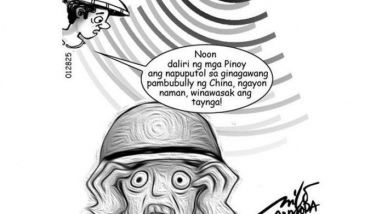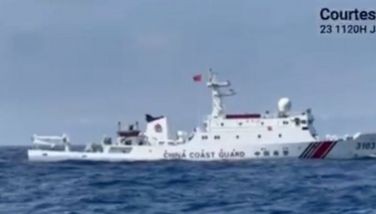Redemption stories
MANILA, Philippines – It took a foreigner to give name to a Filipino trait which the locals perhaps only suspected they had, and very likely took for granted.
Former Chilean ambassador Roberto Mayorga, however, isn’t just any parachute stranger as he at times – at least in this book, “Calidad Humana, Sharing the Filipino spirit” (Energy Development Corp 2015), which he edits – sounds more Filipino than the average Juan. It is only fitting that Mayorga, coming from the land of Neruda, gato negro and a slew of magic realism, would coin the Spanish term for good old Pinoy empathy, malasakit, pakikipag kapwa tao: always the other over the self.
The book itself is billed as volume 1, a compilation of mostly academic essays that expound on the subject as theory and construct, if not an altogether spiritual, life-changing experience.
It was during Mayorga’s term at the embassy that Chile sponsored the photo contest “Smiles for the World,” as well as the poetry writing competition concerning the rescue of dozens of miners after about a month in the bowels of their homeland, both getting ample coverage in the lifestyle pages of the dailies.
Smiles for the World in fact generated a storm of controversy, as the original announced winner was found to have plagiarized work from an online photograph, in effect challenging the essence of calidad humana.
But what happened to UP student Mark Solis was a story of redemption in itself, as the ambassador refused to give up and tasked the youngster to help run a team of homeless kids learning the rudiments of street football.
The photo in the inside pages of this newspaper showing Solis and Mayorga in an avuncular embrace during the book launch tells it all: in calidad humana, there is a second chance, and we don’t mean the movie.
Though the story for sure seems culled from a Latin American novel, and so the stuff of cinema, stranger things have happened but reality is certainly no stranger to fiction. Mayorga described Solis as a changed man, while the prodigal one vowed to continue under the tutelage of calidad humana.
One of the essays was written by Katrin de Guia, a German who has since made her home here setting up house with the filmmaker Kidlat Tahimik, and in which she describes an encounter with a community of babaylan in the hinterlands. She marvels at how the mountain folk efficiently go about their work with hardly any hitches, everyone knowing their role to make visitors such as her feel at ease and something akin to home.
“The words of the babaylan stirred up the goodness of everyone who was around her that day. Her words washed away and healed the heart from pain, like a gentle rain that softens the soil after a long dry spell. Touched by the Self of the Mythic Man who embraces God in all creation, we lost all sense of space and time. We barely noticed that a loud, rattling bus carried us deeper into the dark denseness of the city with its web of plastics, concrete, metals and men” (de Guia, Calidad humana and the Kapwa orientation).
Parallels can be drawn with a passage by one Pepito Bosch, narrating to his friend Cesar Ruiz how once in the forest he and his fellow students in the 1960s had come across a tribe of indigenous nudists, who however moved entirely naturally and without shame that soon enough Bosch’s group felt that despite their clothes, “they themselves were the ones nude.”
In his essay about his pilgrimage to the Virgin of Manaoag, Bro. Mark Joseph Calano relates his journey of several days by foot to Pangasinan from the seminary in Tagaytay, and how he sees minuscule things in each province along the road he would otherwise have not noticed had he been on a vehicle. What made the experience more daunting was that he had to beg for food along the way, and left to God where to crash for the night.
“My grandfather once told me that the proper correlate of love was the unlovable, of forgiveness the unforgivable, and of hope the unjustifiable. He told me that life would be harsh on me, but that it was not enough to give up… He told me never to be perfect, for I would fail; but he warned me to be always faithful. He also told me that I should learn to forgive myself – to stand up, and to continue walking… That was enough for me – that everyday was an opportunity to say yes. That everyday was an opportunity to make space, to make one’s self available, to be present to the God who seeks me” (Calano, Camino al corazon and calidad humana).
The brother’s last meal before reaching Manaoag is provided by a farmer – dried herring and rice – which he says never tasted so good. Again an analogy can be drawn to the multitudes on an inter-island ship who patiently line up for their meals at the cafeteria, at times consisting of no more than sardines, hardboiled egg and rice, but something to warm the stomach in the long, wobbly journey.
At night these same multitudes gather in the cafeteria turned into a karaoke plaza with canned beer for sale, many waiting for their turn at the mic, but there are no hotheads even if one would dare to sing “My Way.”
We can only guess what the second volume of Calidad Humana will contain, though certainly it would help make the world less cynical.
The good envoy has since been named consultant to a Lopez energy company after his time at the embassy. Thanks are due him for having such faith in the Filipino, more than the politicians who can only offer lip service.
And for his supreme optimism, though the term calidad humana itself reminds us of a volume of poems by the Peruvian Cesar Vallejo, Poemas humanos, the selfsame poet of “The Black Riders” where a translated line goes, “there are blows in life so hard… I don’t know.”
But when the ambassador speaks of redemption, we can only listen.
- Latest
- Trending


















